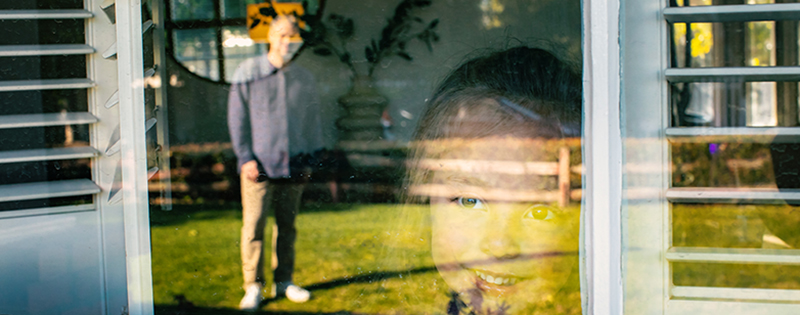
“The teachings of Jesus challenge conventional assumptions about family and simultaneously lay the groundwork for a new concept of family marked by discipleship,” writes Chris Blumhofer, in his article on “Family in the Gospel of Mark” (p. 40).
We know this to be true of all areas of life, don’t we? Jesus transforms. The way of his kingdom upends how we see the world and the way we live in it. The Spirit renews our hearts, our minds, our strength. Our work, our play. Our hopes, our fears. This issue of FULLER magazine considers the particular question of how our faith shapes, and reshapes, our understanding of “family.”
As Dr. Blumhofer writes, the way of Jesus means a redefinition of kinship and community; it means a renewed perspective
on the connections between people and the ways we belong to one another.
The idea of family—across cultures, generations, circumstances, and contexts—is complicated, of course. All families, like all people, differ. Some are large, some are small. Some are healthy, some less so. Some families are biological, some are chosen, some are brought together by circumstance. Despite what some of us may picture in our minds as an archetypal or “traditional” family, we know that family is multifaceted and charged with beautiful complexity. Still, Jesus calls each of us to faithfulness, as we each live in our own configurations and systems of family, wherever we find ourselves.
I’m thankful that a significant part of Fuller’s work and mission, through its Marriage and Family Therapy program in particular, involves the deep work of “bringing healing and wholeness to individuals, couples, and families in their relationships.” Faculty of our MFT program— Miyoung Yoon Hammer, Michael Hardin, Cameron Lee, Alesia Starks—guest edited this issue, which seeks to explore what family looks like in the kingdom of God.
In these pages, Ebson Simick and Tryfina Phipon share about their journey of planting a church as a married couple, Kristin Young reflects on pursuing a theological education after the loss of her son, and Eric VanValin recounts his story of becoming a foster parent. Cameron Lee writes about a healthy way of caring for pastors’ kids, while Nicole Boymook looks at the power and beauty of a chosen family, and Michael Hardin asks the question of what happens to a family when a member walks away from the faith. Additionally, Les and Leslie Parrott discuss what healthy marriages can look like, as Ahren Martinez talks about ministering to the emerging generation.
I’ll say up front: certain configurations and aspects of family are missed in these pages. One hundred pages can only cover so much. Yet our hope is that the voices you find in these pages offer a glimpse of how the gospel transforms our imagination of what family can be, of how we might walk together as families in the way of Jesus, and of how we ought to care for one another as sisters and brothers in the kingdom of God.

Jerome Blanco, Editor in Chief
“The teachings of Jesus challenge conventional assumptions about family and simultaneously lay the groundwork for a new concept of family marked by discipleship,” writes Chris Blumhofer, in his article on “Family in the Gospel of Mark” (p. 40).
We know this to be true of all areas of life, don’t we? Jesus transforms. The way of his kingdom upends how we see the world and the way we live in it. The Spirit renews our hearts, our minds, our strength. Our work, our play. Our hopes, our fears. This issue of FULLER magazine considers the particular question of how our faith shapes, and reshapes, our understanding of “family.”
As Dr. Blumhofer writes, the way of Jesus means a redefinition of kinship and community; it means a renewed perspective
on the connections between people and the ways we belong to one another.
The idea of family—across cultures, generations, circumstances, and contexts—is complicated, of course. All families, like all people, differ. Some are large, some are small. Some are healthy, some less so. Some families are biological, some are chosen, some are brought together by circumstance. Despite what some of us may picture in our minds as an archetypal or “traditional” family, we know that family is multifaceted and charged with beautiful complexity. Still, Jesus calls each of us to faithfulness, as we each live in our own configurations and systems of family, wherever we find ourselves.
I’m thankful that a significant part of Fuller’s work and mission, through its Marriage and Family Therapy program in particular, involves the deep work of “bringing healing and wholeness to individuals, couples, and families in their relationships.” Faculty of our MFT program— Miyoung Yoon Hammer, Michael Hardin, Cameron Lee, Alesia Starks—guest edited this issue, which seeks to explore what family looks like in the kingdom of God.
In these pages, Ebson Simick and Tryfina Phipon share about their journey of planting a church as a married couple, Kristin Young reflects on pursuing a theological education after the loss of her son, and Eric VanValin recounts his story of becoming a foster parent. Cameron Lee writes about a healthy way of caring for pastors’ kids, while Nicole Boymook looks at the power and beauty of a chosen family, and Michael Hardin asks the question of what happens to a family when a member walks away from the faith. Additionally, Les and Leslie Parrott discuss what healthy marriages can look like, as Ahren Martinez talks about ministering to the emerging generation.
I’ll say up front: certain configurations and aspects of family are missed in these pages. One hundred pages can only cover so much. Yet our hope is that the voices you find in these pages offer a glimpse of how the gospel transforms our imagination of what family can be, of how we might walk together as families in the way of Jesus, and of how we ought to care for one another as sisters and brothers in the kingdom of God.
Jerome Blanco, Editor in Chief
David Emmanuel Goatley, Fuller Seminary president, reflects on how widening our understanding of family transforms our Christian witness.